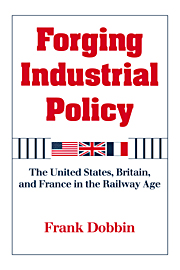4 - Britain
Published online by Cambridge University Press: 05 June 2012
Summary
Introduction
Because Britain was the first nation to undergo an industrial revolution, the British soon became convinced that their peculiarly noninterventionist state traditions deserved much of the credit. There was no evidence in the experiences of other nations to refute this idea. By the beginning of the nineteenth century, Adam Smith had articulated a positive theory of economic growth based on English political traditions. By the 1830s, the term laissez faire was being used to describe an industrial culture in which unfettered individual initiative produced economic dynamism and growth. Laissez faire referred to the state's role, which was to refrain from interference with the private economy for fear of disrupting the internal dynamic of growth. In the railway industry, laissez faire translated into policies that gave the state no role in the planning, construction, or operation of railroads. However, over the course of the century the principle was altered as the state began to intervene to protect citizens' rights. Parliament scrutinized railway charters to protect landowners from unnecessary expropriation, oversaw railway operations to protect citizens against the untold perils of railway travel, and regulated third-class rates to guard the poor from the excesses of greedy entrepreneurs. These early interventions helped to open the door for positive industrial policies, which came in the form of protections for the small firms that the British had come to see as the mainspring of economic growth.
- Type
- Chapter
- Information
- Forging Industrial PolicyThe United States, Britain, and France in the Railway Age, pp. 158 - 212Publisher: Cambridge University PressPrint publication year: 1994

